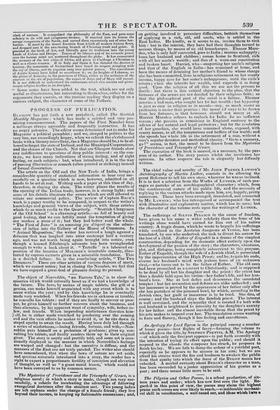The sufferings of SiLvio PELLico in the cause of freedom,
have given to his name a wider celebrity than the fame of his writings alone would have earned for him out of his native country. A tragic drama, which he wrote to beguile his sufferings while confined in the Austrian dungeons at Venice, has been translated, by one who undertook the task to divert his sorrow for the loss of a child. Esther of Engaddi is a drama of the simplest construction, depending for its dramatic effect entirely upon the development of the passion of the story ; the characters, situations, plot, and dialogue, being completely subservient to this purpose. Esther of Engaddi, though the wife of a Jewish chief, is persecuted by the importunities of the High Priest; and he, to gain his ends, alarms her husband's mind with jealous fears of an unknown rival,—who turns out to be the father of Esther. The old man had been proscribed as a convert to Christianity, and is supposed to be dead by all but his daughter and the priest the priest has thus a double hold upon his victim—her father's hue, and her hus- band's love. She at last defies and denounces the sacerdotal tempter : but her accusation and defence are alike unheeded ; and her innocence is proved by the appearance of her father only after she has partaken of the poisoned bowl, by which, according to the Jewish rites, her guilt or innocence is to be tried. She dies, of course; and the husbaud slays the fiendish priest. The interest is well sustained, and the sympathy that is created for both wife and husband is heightened to intensity by the daughter's anxiety for her father, and the almost inevitable doom that the priest by his arts makes to impend over her. The translation seems wanting in force and fluency, though it has feeling and smoothness.


























 Previous page
Previous page